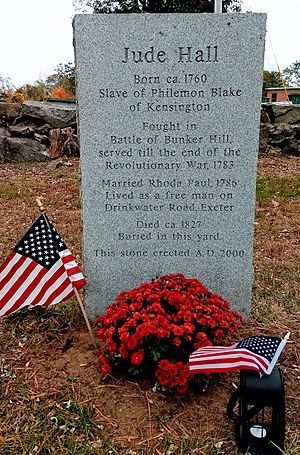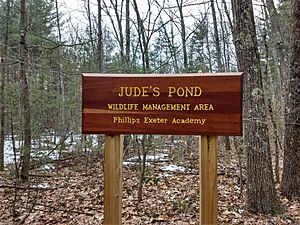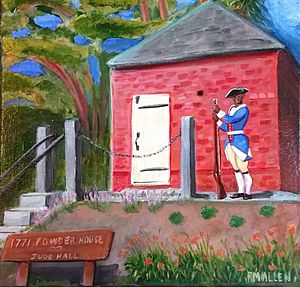Jude Hall facts for kids
Jude Hall was an amazing African-American soldier. He fought in the American Revolutionary War from 1775 to 1783. Because of his service, he earned his freedom from slavery. After the war, he got married and made his home in Exeter, New Hampshire. His old home is still known as Jude's Pond today. Sadly, three of his children were taken and sold into slavery. But his family kept fighting for freedom: two of his grandsons later fought in the American Civil War.
Contents
Jude Hall's Military Service
Jude Hall joined the army in May 1775. He was from Exeter, New Hampshire. He served in the 3rd New Hampshire militia. He fought for eight years in the Revolutionary War. He served under General Enoch Poor. His bravery helped him gain his freedom from slavery.
In 1855, a book called Colored Patriots of New Hampshire wrote about him. It said he was "a great soldier." People in New Hampshire knew him as "Old Rock." Many believe Jude Hall was the most famous African-American patriot from New Hampshire.
Key Moments in Service
- May 1775: Jude Hall joined the army. He was a private in the 3rd New Hampshire Regiment.
- June 1775: He fought in the Battle of Bunker Hill. A cannonball explosion nearby threw him.
- November 1776: He joined the 2nd NH Regiment for three more years.
- 1777–1779: He was part of many important battles. These included Ticonderoga, Trenton, Saratoga, and Hubbardton.
- Battle of Monmouth: He fought bravely here and earned his nickname "Rock."
- Sullivan-Clinton Expedition: He joined this mission against the Iroquois people. This took place in New York state.
- Later Service: He helped guard forts near West Point.
- December 1779: He joined the 2nd New Hampshire again.
- 1782–1783: He was part of the New Hampshire Battalion.
- 1783: He was honorably discharged. He then returned home to Exeter, New Hampshire.
After eight years of service, Jude Hall received his payment in October 1786.
Jude Hall's Family Life
Jude Hall lived his whole life in the Exeter area. His home as a free man was on Drinkwater Road. It is still known as "Jude's Pond" today. This spot is close to the Blake farm. He may have been born there and lived enslaved there. The area where Jude raised his family is still very natural and quiet. His small two-room home is no longer standing. In May 2022, his homesite became a registered archeological site. It is now part of the Phillips Exeter Academy woods.
His Marriage and Children
Jude married Rhoda Paul in 1785. Rhoda was the sister of Reverend Thomas Paul. They had a large family on Drinkwater Road. Sadly, three of their sons were stolen and sold into slavery. Their names were James, Aaron, and William.
Jude's oldest daughter, Dorothy, married Robert Roberts. He was a butler for a senator. Robert Roberts wrote a book called House Servants Directory in 1827. He gave a statement about 18-year-old James being taken from his home in 1819. Rhoda Hall also sent a statement to The Liberator Newspaper in 1834. She said James sailed on a ship and was sold into slavery in Virginia. Records show him on another ship sailing from Baltimore to New Orleans. Of their sons, only George remained to carry on the family name.
Grandchildren and Legacy
Three of Jude and Rhoda's grandsons fought in the Civil War. Their names were Moses, Aaron, and Luke Hall. Jude and Rhoda's nephew was James Monroe Whitfield. He was an abolitionist poet from Exeter.
Charles Henry Bell wrote about Jude Hall in 1888. He described Jude as a "powerful man." He said Jude could even lift a barrel of cider!
Jude Hall passed away in 1827. His exact burial spot is not known. In 2000, a person related to his former enslaver put up a memorial stone for him. It is in the Winter Street Cemetery in Exeter. This area has stones for other Black patriots. Jude's wife, Rhoda, moved to Belfast, Maine. She lived with her daughters Rhoda Ann and Mary Jane Cook. Rhoda died in 1844 in Belfast. Her memorial is in Grove Cemetery.
As of May 2022, Jude Hall is being considered as an "NSDAR accepted patriot." This means his descendants could claim him in the Daughters of the American Revolution program.
Genealogical Society
In 2021, a Facebook page called "Jude & Rhoda Hall Society" was created. It shares information about their family tree.
 | Selma Burke |
 | Pauline Powell Burns |
 | Frederick J. Brown |
 | Robert Blackburn |





